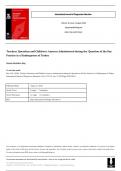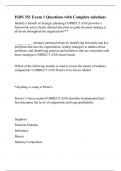International Journal of Progressive Education
Volume 16, Issue 4 August 2020
ijpe.penpublishing.net
ISSN: 1554-5210 (Print)
Teachers' Questions and Children's Answers Administered during the 'Question of the Day'
Practice in a Kindergarten of Turkey
Dondu Neslihan Bay
To cite this article
Bay, D.N. (2020). Teachers' Questions and Children's Answers Administered during the 'Question of the Day' Practice in a Kindergarten of Turkey.
International Journal of Progressive Education, 16(4), 172-191. doi: 10.29329/ijpe.2020.268.11
Published Online August 13, 2020
Article Views 6 single - 7 cumulative
Article Download 14 single - 16 cumulative
DOI https://doi.org/10.29329/ijpe.2020.268.11
Pen Academic is an independent international publisher committed to publishing academic books, journals, encyclopedias, handbooks of research of the highest
quality in the fields of Education, Social Sciences, Science and Agriculture. Pen Academic created an open access system to spread the scientific knowledge freely.
For more information about PEN, please contact: info@penpublishing.net
This document downloaded from 193.140.128.252 [2 times] Eskisehir / Turkey on Sun, 23 Aug 2020 22:51:45 +0300
Pen Academic Publishing, Canakkale/Turkey
Telephone: +90 286 243 06 66 | Fax: +90 286 213 08 00 | info@penpublishing.net | www.penpublishing.net
,International Journal of Progressive Education, Volume 16 Number 4, 2020
© 2020 INASED
Teachers’ Questions and Children’s Answers Administered during the “Question of the
Day” Practice in a Kindergarten of Turkey
Dondu Neslihan Bay i
Eskişehir Osmangazi University
Abstract
In this study, the questions asked by 5 preschool teachers during the “question of the day” practice at
the beginning of the day and the characteristics of the answers given by 240 children of 4-5-year-old
were investigated. Language interactions between teachers and children through 198 questions asked
during the “question of the day” practice at the start of the day activity and 2048 answers were
transcribed and then teachers’ questions were analyzed using the coding scheme comprised of four
defined abstraction levels, and the answers of the children were analyzed according to three defined
abstraction levels. The results revealed that teachers' questions were predominantly preference
(31.3%) questions and likewise, the majority of children's answers were personal preference (46.3%)
answers. Also, it was concluded that; (a) asking creation questions that allow children to express their
original thoughts was least preferred by the teachers; (b) children often preferred to answer recall,
inference and creation questions at the realistic level, and preference questions at the personal
preference level; (c) children mostly gave creative answers to the creation questions of the teachers;
and (d) 5-year-old children prefer to give more creative answers to teachers' questions than 4-year-
olds.
Keywords: Turkey, Preschool Children, Teacher Questions, Children Answers
DOI: 10.29329/ijpe.2020.268.11
-------------------------------
i
Dondu Neslihan Bay, Assoc. Prof. Dr., Early Childhood Education, Eskişehir Osmangazi Üniversitesi,
ORCID: 0000-0002-2656-0458
Correspondence: bayneslihan@gmail.com
172
This document downloaded from 193.140.128.252 [2 times] Eskisehir / Turkey on Sun, 23 Aug 2020 22:51:45 +0300
, International Journal of Progressive Education, Volume 16 Number 4, 2020
© 2020 INASED
INTRODUCTION
In Turkey, particular importance is given to pre-school education and free education in public
schools provides equal opportunities. The objective is to increase the quality of preschool education in
the country and to allow all children benefit from this education (MoNE Annual Report, 2018). The
analysis of pre-school education experience in Turkey will contribute to the teachers in terms of
pedagogy.
Qualified preschool education requires the provision of development and learning
opportunities to the children at school (Sheridan, 2007). One of the most important in-class
pedagogical practices that offers development and learning opportunities is asking questions (Cotton,
1989). Questions increase the success of children in language usage as a result of exposure to an
abstract language (van Kleeck, GiBam, Hamilton, & McGrath, 1997). This study analyzed the quality
and quantity of the questions asked by 5 kindergarten teachers in Turkey and the answers of 73
children emerged as a result of language interaction. As far as it is known, no research has been
conducted with this content, targeting this cultural structure.
The Significance of Teacher’s Questions and Children’s Answers Study
Some motives were considered to be important in planning the study involving the
examination of teachers' questions and children's answers. One of the most important motives is
discovering that the most commonly used teacher statements are questions. In preschool, questions
constitute approximately 30% of teachers’ statements (e.g., de Rivera, Girolametto, Greenberg, &
Weitzman, 2005; Massey, Pence, Justice, & Bowles, 2008; Tompkins, Zucker, Justice, & Binici,
2013; Zucker, Justice, Piasta, & Kaderavek, 2010). This ratio varies according to the inclusion of
class management related statements in the questions. The impact of the questioning technique, which
is widely used and reveals children's learning experiences, should be known (MacNaughton, &
Williams, 2004).
The second important motive is that teacher questions serve as an important pedagogical
strategy to support language development in children. Asking questions that lead children to think
enables the development of children's language usage (Zucker et al., 2010). Children give more
complex answers to cognitively challenging questions such as why and how (Massey et al., 2008).
Numerous researches have shown that the language used by teachers is effective on children's
comprehension and expression of language skills (e.g., Chen and Liang, 2017; Han, Roskos, Christie,
Mandzuk, & Vukelich, 2005; Justice, Meier, & Walpole, 2005; Massey et al., 2008; Wasik & Bond,
2001; Wasik, Bond, & Hindman, 2006; Zucker et al., 2010). Children's answers to open-ended and
cognitively challenging questions, asked for reasoning and interpretation purposes (Massey et al.,
2008), are longer and variable (Chen and Liang, 2017; de Rivera, Girolametto, Greenberg, &
Weitzman, 2005; van Kleeck, Vander Woude, & Hammett, 2006; Zucker et al., 2010).
In addition, teachers' questions are seen as a key practice in directing children to speak
meaningfully by thinking. In this practice, an interaction occurs between teacher and child (Tok &
Sevinç, 2010; Gönen, Ünüvar, Bıçakçı, Koçyiğit, Yazıcı, Orçan, Aslan, Güven & Özyürek, 2010;
Samur and Soydan, 2013). Thanks to the questions, logical and systematic thinking skills of children
start to develop (Dağlıoğlu & Çakır, 2007; Bay & Alisinanoğlu, 2012; Işıkoğlu Erdoğan & Akay,
2015). The child is encouraged to think to use the language in the direction of the cognitive
expectation of the question asked by the teacher (Massey 2004; Massey et al. 2008; Zucker et al.
2010). What is decisive here is the quality of the used questions and their suitability to the cognitive
level of the child, which determine the extent to which these skills can be developed (Bay &
Alisinanoğlu, 2012). Children produce more words to the teacher's cognitively challenging questions
(de Rivera et al., 2005). In the studies, it was observed that children's receptive and expressive
vocabulary increased by asking literal and inferential questions to the children (e.g., van Kleeck et al.,
1997, 2006; Wasik & Bond, 2001; Zucker et al., 2010). These studies were mostly conducted within
173
This document downloaded from 193.140.128.252 [2 times] Eskisehir / Turkey on Sun, 23 Aug 2020 22:51:45 +0300







